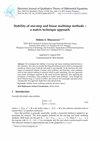ermakov - painlevevl方程的Dirichlet边值问题。哈密顿EPI系统
IF 0.8
4区 数学
Q1 MATHEMATICS
Electronic Journal of Qualitative Theory of Differential Equations
Pub Date : 2023-01-01
DOI:10.14232/ejqtde.2023.1.23
引用次数: 0
摘要
本文引入了一个原型ermakov - painlevevl方程,并分析了齐次dirichlet型边值问题。此外,还建立了一个新的ermakov - painlev本文章由计算机程序翻译,如有差异,请以英文原文为准。
On a Dirichlet boundary value problem for an Ermakov–Painlevé I equation. A Hamiltonian EPI system
Here, a proto-type Ermakov–Painlevé I equation is introduced and a homogeneous Dirichlet-type boundary value problem analysed. In addition, a novel Ermakov–Painlevé I system is set down which is reducible by an involutory transformation to the autonomous Ermakov–Ray–Reid system augmented by a single component Ermakov–Painlevé I equation. Hamiltonian such systems are delimited
求助全文
通过发布文献求助,成功后即可免费获取论文全文。
去求助
来源期刊
CiteScore
1.40
自引率
9.10%
发文量
23
审稿时长
3 months
期刊介绍:
The Electronic Journal of Qualitative Theory of Differential Equations (EJQTDE) is a completely open access journal dedicated to bringing you high quality papers on the qualitative theory of differential equations. Papers appearing in EJQTDE are available in PDF format that can be previewed, or downloaded to your computer. The EJQTDE is covered by the Mathematical Reviews, Zentralblatt and Scopus. It is also selected for coverage in Thomson Reuters products and custom information services, which means that its content is indexed in Science Citation Index, Current Contents and Journal Citation Reports. Our journal has an impact factor of 1.827, and the International Standard Serial Number HU ISSN 1417-3875.
All topics related to the qualitative theory (stability, periodicity, boundedness, etc.) of differential equations (ODE''s, PDE''s, integral equations, functional differential equations, etc.) and their applications will be considered for publication. Research articles are refereed under the same standards as those used by any journal covered by the Mathematical Reviews or the Zentralblatt (blind peer review). Long papers and proceedings of conferences are accepted as monographs at the discretion of the editors.

 求助内容:
求助内容: 应助结果提醒方式:
应助结果提醒方式:


